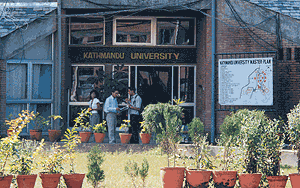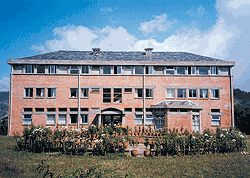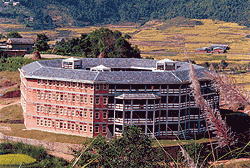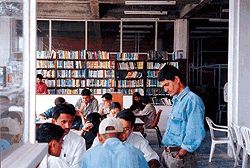 Then Nepal's first university was established in 1959 it heralded a new chapter in Nepal's history. Within years Tribhuvan University was plagued by the ills legion in government-controlled institutions. By now, TU is not a total failure, but it is a measure of students' discontent that in five short years another institution has earned more respect from academics, students and parents than TU was able to garner in its four decades of existence.
Then Nepal's first university was established in 1959 it heralded a new chapter in Nepal's history. Within years Tribhuvan University was plagued by the ills legion in government-controlled institutions. By now, TU is not a total failure, but it is a measure of students' discontent that in five short years another institution has earned more respect from academics, students and parents than TU was able to garner in its four decades of existence. It was in 1985 when Dr Suresh Raj Sharma helped found the Kathmandu Valley Campus in Pulchowk. As it turned out it was just the first rung of the ladder he intended to climb. "The education scenario was terrible," says Dr Sharma. "There were only a few good colleges that provided quality education. Whatever few resources educational establishments had at their disposal were not being used properly. We felt we had to do something about it or the generations to come would blame us for not providing them with quality education."
The Kathmandu Valley Campus was initially affiliated to the Tribhuvan University and offered Intermediate in Science courses, but unlike other colleges in the Valley, it was very selective and wanted only the best. Dr Sharma says that the aim was to eventually establish a university. Five years later, in November 1991, Kathmandu University was chartered by an Act of Parliament. A 28-member University Senate was formed to lay down the policies that would govern KU, with the then Prime Minister Girija Prasad Koirala as Chancellor and Dr Suresh Raj Sharma as Vice-Chancellor. "What we had in mind was academic autonomy, but in a completely public property that would not be for profit," says Dr Sharma.
 KU began its own Intermediate in Science course in July 1992, when the School of Science was opened in Tangal. After that, faculties were added swiftly and easily. In 1993, the School of Management started functioning in Baneswore offering an MBA programme. The following year, the academic council decided to introduce three-year degree programmes for BA and BSc pass and four-year programmes for BA and BSc honours, the BE, and the BPharm.
KU began its own Intermediate in Science course in July 1992, when the School of Science was opened in Tangal. After that, faculties were added swiftly and easily. In 1993, the School of Management started functioning in Baneswore offering an MBA programme. The following year, the academic council decided to introduce three-year degree programmes for BA and BSc pass and four-year programmes for BA and BSc honours, the BE, and the BPharm. That same year the School of Engineering was established at the university's new grounds in Dhulikhel. And this is where the story gets really interesting for it provides a perfect example of a symbiotic partnership between an outside insitution and a local community.
About 30 km southwest of Kathmandu on the outskirts of the Valley lies the picturesque Dhulikhel municipality. Dhulikhel is not just another municipality. What sets it apart is the commitment its citizens have shown in taking their area forward in the field of education. Until 1990 there was only one high school in the municipality and a huge portion of the students were failing the School Leaving Certificate exams. "The Nagar Panchayat in the pre-democracy days and the municipality after 1991 always prioritised education. We were enthusiastic but lacked the resources. We desperately wanted to do something about it," says Bel Prasad Shrestha, mayor of Dhulikhel. Shrestha, an independent candidate, is serving his third term as mayor of the municipality and is also on the KU Senate.
At the same time, KU's founders were looking for land in a place that would suit their goals and ambitions. They looked around and found a perfect match in Dhulikhel. The municipality was so happy at the prospect of having an institution of higher education, that they did more than just give KU their approval. "We made a commitment to the university that we would not only provide the land it needed, but also build the basic infrastructure-roads, water supply, and electricity," says Mayor Shrestha. The university received over 3.5 ha of land and 50 percent of the municipality's annual budget, a little over Rs 3 million.
 In return KU reserves a certain number of seats for students from the area. But the university's real impact has been much more than just that. Students from Dhulikhel got into the KU but the course was so difficult, it was impossible for them to do well. Realising the problem wasn't with the students but with the education system, the Dhulikhel municipality and KU came up with a four-year project to improve the quality of education in all the schools in Dhulikhel.
In return KU reserves a certain number of seats for students from the area. But the university's real impact has been much more than just that. Students from Dhulikhel got into the KU but the course was so difficult, it was impossible for them to do well. Realising the problem wasn't with the students but with the education system, the Dhulikhel municipality and KU came up with a four-year project to improve the quality of education in all the schools in Dhulikhel. After initially deciding to work on training teachers at the higher secondary level, the university realised that the roots of the problem went much deeper. So they decided to train all teachers, from the primary level up. One of the most interesting results of the programme has been the debate it has sparked off in what "quality schooling" means-in the particular context of Dhulikhel schools where resources even as basic as toilets are sometimes non-existent.
As for the KU, it too is moving on and today has schools of science, management, engineering, arts (which even offers a BA in music), education, and medical science. Its affiliates offer bachelor's degrees in social work, medicine, management, environment and development studies. KU's MBA and BBA programs are reputed to be the best in the country and 12 colleges in Pokhara, Bharatpur, Nepalganj and Kathmandu have been granted affiliation. Tribhuvan University had been mandated to modernise the nation, but 80 percent of the students it trained were in the humanities, and the technical manpower all had to be trained outside the country for more than two decades. KU seems to be taking on this role now, with its diverse course offerings.
While expanding faculties, KU is also committed to maintaining its high standards and making students aware of the value and aims of a good education. Today, KU graduates are all over the Valley, working as nurses and teachers, and in market research organisations, consulting firms and in IT. Many even start their own firms.
 Atul Shrestha joined the MBA programme in 1998 and was surprised by the amount of work he had to put in and by how much the teaching-learning process excited him. "It was all so interactive and practical that later when I started working I felt confident and ready to take on the world," he says. Shrestha recently founded a consulting firm which offers managerial and IT advice.
Atul Shrestha joined the MBA programme in 1998 and was surprised by the amount of work he had to put in and by how much the teaching-learning process excited him. "It was all so interactive and practical that later when I started working I felt confident and ready to take on the world," he says. Shrestha recently founded a consulting firm which offers managerial and IT advice. Ayush Karki, a third-year computer science student at KU, says he knows why the university is doing so well. Apart from the teaching style, he attributes its success to the absence of political unions, which he believes, allows students there to focus on learning, unlike what often happens at Tribhuvan University.
The KU campus is well equipped in terms of infrastructure, grounds, hostels for boys and girls, and staff quarters. Resources for students are improving every year-over 300 of the university's 1,850 students are on scholarship. There is not much the teachers can complain about. They are given ample opportunities to go abroad, and come back better prepared in their subjects.
All this costs money and certainly KU is much more expensive than Tribhuvan University, but officials say it is all accounted for and put back into the school. "Every paisa students pay goes exclusively into their education, and the government funds go for physical development. We have to keep a certain standard so that the market can judge us," says the vice-chancellor.
The other major advantage is in numbers. Unlike TU, which has over 190,000 students, KU says it will never enrol more than 2,500 at a time, to maintain the high 1:10 teacher-student ratio.
What is most encouraging is that almost all the KU alumni we spoke to seemed determined not to leave the country. Having got a good university education here, they say, makes them more optimistic about the future of the country. So they stay here and utilise their skills. Whether they are computer engineers or environmental engineers, managers or musicians, KU's students form a small but growing workforce of homegrown talent that Nepal urgently needs.


